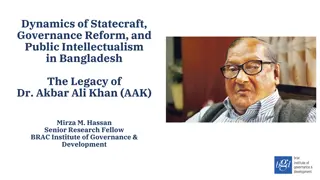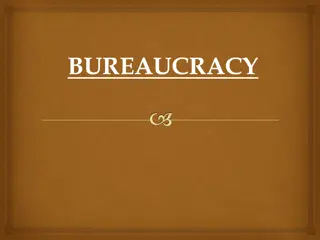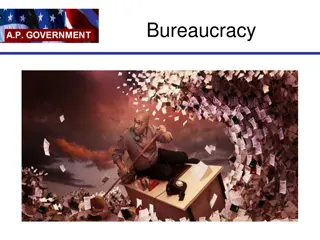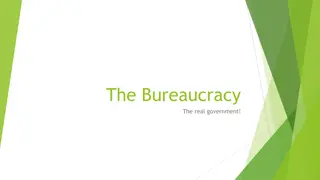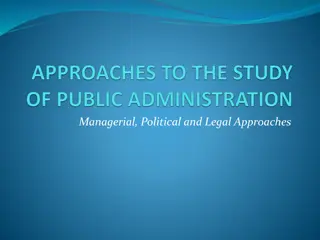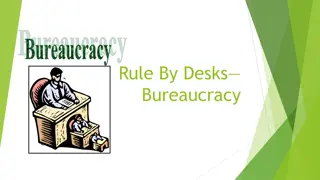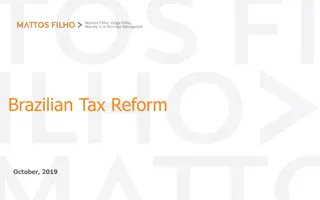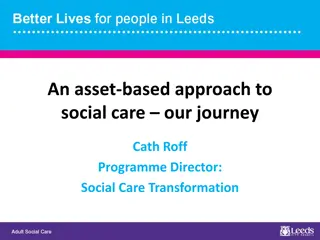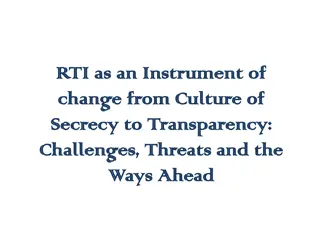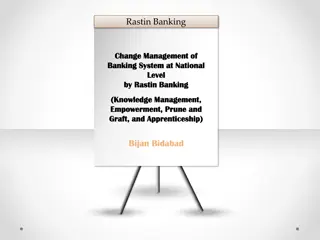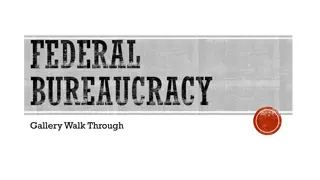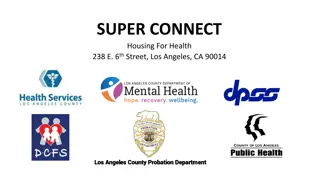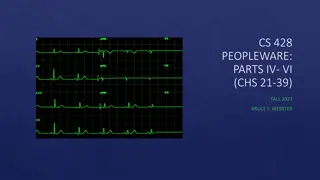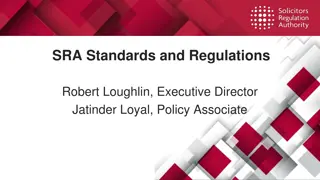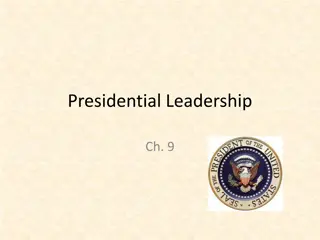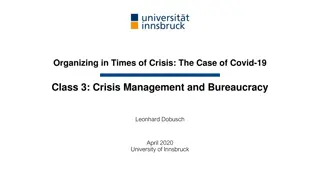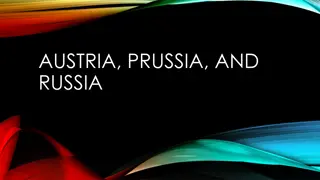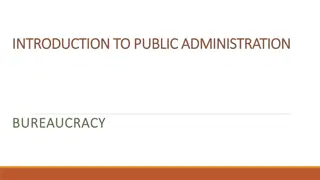Understanding the U.S. Presidency: Roles and Structure
Explore the establishment of the executive branch in the U.S., including the role of the President, qualifications required, informal expectations, and key terms related to the presidency. Delve into the intricate balance of powers and responsibilities within the executive branch, alongside discussi
3 views • 19 slides
Dynamics of Statecraft and Public Intellectualism: The AAK Legacy
Dr. Akbar Ali Khan, a notable figure in Bangladesh, made significant contributions to statecraft, governance reform, and public intellectualism. His oeuvre encompassed topics such as economics, politics, society, rule of law, bureaucracy, and more. AAK's role as a public intellectual involved contex
0 views • 15 slides
Understanding Bureaucracy: Origins, Meanings, and Key Features
Bureaucracy, derived from the Latin term 'bureau', has evolved to represent a system of officials in power within public administration. This article explores the origins of the term, its various interpretations, and key features such as hierarchy, chain of command, and adherence to rules and regula
3 views • 34 slides
Understanding Bureaucracy: Origins, Functions, and Myths
Explore the concept of bureaucracy, tracing its origins and elements according to Max Weber's analysis. Discover the evolution from patronage to the merit-based system and debunk common bureaucratic myths prevalent in society. Gain insights into the role of civil servants and the intricate workings
4 views • 54 slides
Understanding the Bureaucracy: Myths, Realities, and History
Delve into the intricacies of bureaucracy through a comprehensive exploration of its myths, realities, and historical evolution. Discover the structure, functions, and challenges faced by bureaucratic systems, while gaining insights into the civil service, merit principle, and the dynamics of govern
0 views • 10 slides
Understanding Managerial, Political, and Legal Approaches in Public Administration
Public administration is viewed through three main approaches: managerial, political, and legal. The managerial approach minimizes the distinctions between public and private administration, focusing on efficiency and bureaucracy.
0 views • 17 slides
Understanding Bureaucracy: Structure and Functions
Professional corps of unelected officials organized in a pyramid hierarchy function under impersonal rules. They are hired through Civil Service or Foreign Service Exams. Bureaucratic bodies include Cabinet departments, Regulatory Agencies, Government Corporations, and Independent Executive Agencies
0 views • 16 slides
The Swaraj Party: Formation, Background, and Aims
The Swaraj Party, a breakaway group from the Indian National Congress, was formed in 1923 by C.R. Das and Motilal Nehru following the withdrawal of the Non-Cooperation Movement. The party aimed for dominion status, autonomy, and self-rule, emphasizing control over bureaucracy and local bodies. The s
0 views • 12 slides
Overview of Brazilian Tax Reform Proposal
The Brazilian Tax Reform proposal in October 2019 aims to address challenges in the current tax system by introducing changes such as a broader tax basis, simplification, and centralized collection. The proposal includes various key elements like PEC 45/2019, PEC 110/2019, and PEC 128/2019, aiming f
3 views • 5 slides
Transforming Social Care Through Strengths-Based Approach and Community Empowerment
Embracing a strengths-based approach to social care, Cath Roff led a transformative journey in Leeds by empowering social workers and engaging communities. This shift involved changing conversations, focusing on individual strengths, enhancing community capacity, and reducing bureaucracy in service
0 views • 32 slides
Impact of Right to Information Act on Transparency and Accountability: Challenges and the Way Forward
The Right to Information Act is a crucial tool in transforming the culture of secrecy to transparency. It aims to promote accountability, eradicate corruption, and empower citizens. However, the implementation of RTI faces challenges such as lack of proactive thinking in bureaucracy and infrastructu
11 views • 15 slides
Examination of Free Will and Individual Autonomy in "Whose Life is it Anyway?" by Brian Clark
The play "Whose Life is it Anyway?" by Brian Clark delves into the complex debate of free will and individual autonomy versus authority and bureaucracy in the context of healthcare. Ken Harrison, paralyzed from the neck down, challenges the medical profession and explores the limits of personal free
1 views • 14 slides
Understanding Policy Change in the Baltic Sea Region
Financial and fiscal bureaucracy in the Baltic Sea Region is examined, focusing on micro-level practices and routines within public sector organizations. Case studies from Estonia, Latvia, Sweden, Norway, Lithuania, and Southeast Asia are analyzed to understand the implementation of financial and fi
4 views • 7 slides
Innovative Methods for Banking System Change Management at National Level
Changing the banking sector of a country requires innovative methods such as grafting novel processes, pruning old inefficient ones, harmonizing the organization, and empowering staff through apprenticeship and knowledge management. Historical changes in management evolved from Weber's Bureaucracy t
0 views • 31 slides
Understanding Federal Bureaucracy: Gallery Walk Insights
Explore the intricacies of the federal bureaucracy through a gallery walk activity focusing on elements, effectiveness, roles, and characteristics. Engage in reviewing key concepts, critiquing a cartoon depiction, and reflecting on benefits and drawbacks of bureaucracy. Enhance essential skills in i
0 views • 10 slides
SUPER.CONNECT.Housing.For.Health - Innovative Support for Homeless Individuals in Los Angeles
Super.Connect is a problem-solving team in Los Angeles County that assists homeless individuals and families in accessing health and housing services efficiently. Comprised of county experts, the team cuts through bureaucracy to provide real-time decisions and solutions. Super.Connect does not manda
0 views • 11 slides
Building Productive Teams: Key Concepts and Strategies
Understanding the dynamics of productive teams is crucial for achieving success in any organization. This entails aligning individual and team goals, fostering a sense of identity and enjoyment, and avoiding factors that can impede team cohesion, such as defensive management and bureaucracy. Encoura
0 views • 9 slides
SRA Standards and Regulations Overview
Across England and Wales, the SRA regulates a vast community of legal professionals and firms, focusing on high standards, reducing bureaucracy, and public protection. The new codes of conduct emphasize flexibility and simplicity, with updated principles and rules for authorization. The changes allo
0 views • 38 slides
Political Development Theory and Practice: An Overview
Political development refers to the evolution of institutions forming the political power system of a society. Initially popular in the 60s-70s to describe political change, it later fell out of favor for being Euro-centric but has since regained significance. The concept encompasses aspects like po
0 views • 13 slides
Understanding Presidential Powers and Leadership in the U.S.
The Constitution lays a broad framework for presidential powers, with inherent powers being claimed by presidents outside the Constitution. Informal sources of power, such as executive privilege, also play a role. Modern presidents use mass media to build support for their ideas but face limitations
0 views • 21 slides
Understanding Bureaucracy in Times of Crisis: Lessons from Covid-19
Exploring the role of bureaucracy in crisis management, this study delves into Max Weber's perspective on the precision and stability it offers. It discusses the concept of Weberian Bureaucracy as a modern form of organization, emphasizing hierarchy, specialization, and centralized control. Addition
0 views • 15 slides
Rise of Hapsburgs and Prussia in Europe: War, Expansion, and Power Struggles
Series of conflicts including the Thirty Years War shaped the rise of Hapsburg Austria and emerging Prussia in Europe. The Hapsburg Empire expanded under Maria Theresa's reign, while Prussia developed efficient bureaucracy and a formidable military. Frederick William I and Frederick II played key ro
0 views • 17 slides
Innovative Approaches in Quality Frameworks for Social Services: The Maltese Experience
This workshop presentation by Alistair de Gaetano from the Directorate for Disability Issues in Malta discusses starting points, processes, reforms, and the importance of involving stakeholders in creating quality frameworks for social services, with a focus on person-centric approaches and UNCRPD g
0 views • 7 slides
Understanding Max Weber's Bureaucracy Theory
Max Weber, a renowned sociologist and political economist, developed the Theory of Bureaucracy in the early 20th century to address the challenges of industrial revolution in Germany. His principles emphasized efficiency and effectiveness in organizational administration. Despite some misconceptions
0 views • 23 slides

